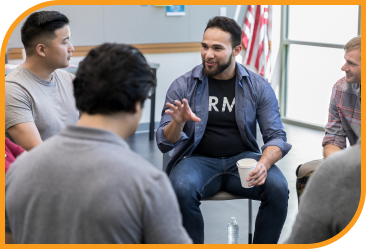Call 988 and press 4 for the Native and Strong Lifeline, available 24/7.

Native people have a higher per-capita rate of military service than any other ethnic group. In some families, service spans generations as far back as the Revolutionary War. Native Americans enlist to defend their home and land, and to create good lives. For many, service is a source of honor and pride. Yet, some veterans experience mental health issues and thoughts of suicide.
Culturally appropriate support is available for Native veterans in Washington state—whether that means talking with an elder, starting mental health counseling online or in person, or learning about other resources available such as food and shelter.
Suicidal thoughts can happen to anyone, including those who’ve served. It’s a sign of strength to get support—for you or your relatives.
Veterans can feel isolated when they return home from service. Friends, relatives and communities who reach out and check in with veterans can help protect them.

Many veterans share similar experiences during and after service. They may find comfort in connection with fellow veterans, whether in their community or online. Spending time with people who have shared experience can help improve mental health, including thoughts of suicide.

Connect veterans with elders, traditional language speakers and cultural specialists who engage with traditions like dancing, food and storytelling. Make plans that include veterans in activities. Find ways to help veterans mentor youth—passing knowledge and customs to the next generation can be healing for many people.

Traditions, like coming-home ceremonies, are a source of strength, connection, and support. Some Native veterans cope better with anger, depression and post-traumatic stress when they take part in rituals connected to war, service and healing.

Store firearms and ammunition in secure places. Have a plan for handling access to firearms if someone in your life has a mental health crisis.

Encourage Native veterans to talk about their experiences with professional therapists. Look for therapists who specialize in working with Native people or veterans. If services are located far from where you live, consider online counseling.
Native and Strong Lifeline
If you’re thinking about suicide or struggling emotionally or mentally, talk with a friend or relative, or call the Native and Strong Lifeline:
Finding support for houselessness, unemployment, and other hardships can improve your mental health. The Native Resource Hub can help you find housing, food, utility assistance or other resources, including cultural resources.